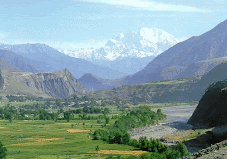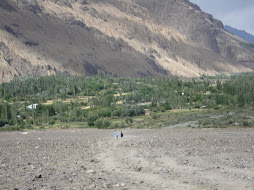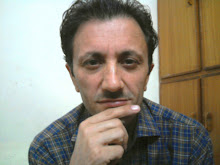By Maureen Lines
MY charity’s website brings me some fascinating emails. A month or so ago, there was one from a couple of American journalists. They wanted to come and visit the Kalash valleys. They wished to do a story on the Kalash, preferably about their being in a Muslim-dominated land.
The questions they asked left little doubt that they were going to make the Kalash out to be vulnerable in a Muslim world. They came with preconceived ideas that I did not endorse. After a number of emails, they suddenly disappeared. Perhaps visiting the Kalash valleys had lost their magic.
The other day I received an email from the chairman of my trustees. A journalist friend from the Daily Telegraph had contacted him, wanting to do an article on the Kalash. As we are always looking for funds to stock our dispensaries, our chairman had immediately given him my contact numbers.
I immediately called the journalist. The English accent was full of enthusiasm. Within seconds he was saying: “Now what about this conversion problem?”
When I said there was no wholesale conversion, only a few cases a year, his crestfallen voice petered out. I told him there were some good stories up there, and I could facilitate his visit. He said his editor would not be interested.
The first thing I heard about religion came from my grandfather. Maybe I was five or 10, I do not recall. But I remember vividly his words: all wars, one way or another, are fought in the name of religion. During the First World War, being a conscientious objector, he had joined up as a medical worker and spent the war in the trenches as a stretcher bearer.
His words were uttered some 60 years ago. Nothing has changed in our civilised world. So much misunderstanding exists in the world today, much of it due to propaganda and the corporate media of the West. On the other hand, thanks to the Internet, civil society is becoming more aware and alert to the nefarious actions and policies of corrupt and aggressive governments.
All of us are born into a certain culture which promotes a certain way of life and thought. None has the right to say that one way of life is better than another. In 1964, I hitchhiked through the Middle East. The spirit with which my entry into Muslim villages and homes was met at that time has had a lasting effect on me.
Universality is the only path to enlightenment. We are all citizens of the world. We need to work together to ease the difficulties of climate change, which is not a myth; it is very real as anyone can see if they ven-
ture into the rural areas of the mountains. In the Kalash valleys, springs are drying up, floods are becoming more common and the winter season is becoming more severe and beginning earlier.
The Kalash valleys lie close to the Durand Line in the north. Religious scholars, adventurers, traders (in Bumburet, the path over the Shawal Pass is part of the old Silk Route) have travelled across rugged mountains since time immemorial. So may have Osama, as he once stayed in a house in Bumburet. I did also in 1998 and 1999.
My travels across Nuristan reminded me of my journey of 1964. I was given the same warnings by good God-fearing Christians about being murdered, raped and so on. As in 1964, I was met with kindness, hospitality and respect.
Being a medical person, I did give some medical aid, but with few drugs, due to limited financial resources; it was nothing compared to what I received.
In Chaga Serai, I met up with a group of Pakistani religious scholars fresh from Saudi Arabia. Although their views were extreme, they extended every courtesy to me. They were bright, charming young men.
On my return from Shiwi, near the front at that time (this was the time of Najibullah), I accidentally landed up in Wahabi hands, the most feared name for westerners in Afghanistan at that time. The Syrian in charge, and the Egyptian I spoke to who headed the centre and was a quiet unassuming, polite man but not overly friendly ( and bore a remarkable resemblance to a well known figure), were just as courteous and hospitable.
Although travellers do come from Taliban areas, I have never seen them try and convert the local Kalash population. I have spent much time in the Nuristani village of Shaikonondai in Rumbur. The people there mind their own business.
In Birir, Muslims outnumber the Kalash; every year, a couple of women marry Muslims; or youngsters are converted by the thought of bettering themselves. In the 28 years I have been there, I have never seen any attempt at wholesale conversion
Madressahs have opened in the area and time alone will tell if that poses a danger to Kalash culture. Hostility and suspicion of another’s religion smack of insult. To seek to find something objectionable in one’s religion is to court enmity and aggression.--Dawn
Wednesday, August 27, 2008
Subscribe to:
Post Comments (Atom)
Awesome and rugged

Beauty of Chitral

Kishmanja, a beautiful village in Yarkhun valley
Lush green

DIZG: threatened by floods

The legendary village of Ayun in Chitral

On way to Bumburet
Dizg, Yarkhun

Blog Archive
-
▼
2008
(197)
-
▼
August
(31)
- Culture's role in treatment of new mothers
- Infant mortality rate cut in Chitral
- Probe against revenue officer urged
- PML-Q MNA Mohiuddin joins PPP
- Few conversions in Kalash
- Truckers demand opening of Chitral-Dir road
- Chitral-Peshawar road closed at Lowari
- Compensation sought for festival's cancellation
- Community school set up in Yarkhun valley of Chitral
- Two heroes
- Wah blasts: body of Chitrali victim brought home
- 800 TB patients detected in Chitral every year
- Steps urged to reduce losses during disasters
- Position holders get cash awards
- Chitral's peace to be maintained
- Chitral forest a `windfall' for timber mafia
- Accord signed for Kalash valley uplift
- Lowari tunnel digging to complete by December
- Lowari tunnel digging to complete by December
- Plots distributed among heirs of policemen
- Plots distributed among heirs of policemen
- Chitral streets teem with garbage, where is TMA
- More girls colleges for Chitral demanded
- Chitral BHUs without doctors
- Wanted a bridge for Yarkhun valley
- TMA Chitral allocates funds for Tajikistan road
- Naib nazim resigns over minister's remarks
- Unesco urged to save ancient sites in Mastuj
- save ancient sites of Chitral
- Govt advised against Kabul route for power import
- Helicopter to the roof of the world
-
▼
August
(31)
About Me

- Zar Alam Khan Razakhel
- Village Dizg, Yarkhun valley, Chitral, Pakistan
- I blog at http://chitraltoday.net (ChitralToday) about Chitral, its people, culture, traditions and issues. I have been writing about Chitral since 2000. Chitral is a scenic valley in the extreme north-west of Pakistan.
No comments:
Post a Comment